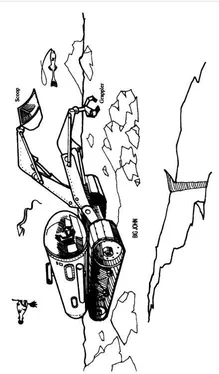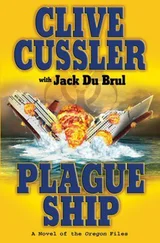Old Gert was built to withstand the immense pressures found at the deepest parts of the world’s seabeds. Her support systems could keep a crew alive for forty-eight hours, and she was powered to travel through the black abyss at speeds up to eight knots.
Craig Plunkett, the chief engineer and pilot for Old Gert , signed the last of the check-off forms. He was a man of forty-five or fifty, with graying hair combed forward to cover his baldness. His face was ruddy and his eyes a medium brown with a bloodhound droop. He had helped design Old Gert and now treated her as his own private yacht.
He pulled on a heavy woolen sweater against the expected chill from the cold bottom water and slipped his feet into a pair of soft fur-lined moccasins. He descended the boarding tunnel and closed the hatch behind him. Then he dropped into the control sphere and engaged the computerized life-support systems.
Dr. Raul Salazar, the expedition’s marine geologist from the University of Mexico, was already in his seat adjusting a bottom sonar penetrating unit.
“Ready when you are,” said Salazar. He was a small dynamo with a huge mass of black hair, his movements quick, black eyes darting constantly, never staring at any one person or object for more than two seconds. Plunkett liked him. Salazar was the kind of man who accumulated his data with a minimum of fuss, made the right decisions without clouding the facts, and was accustomed to engineering a deep-sea probe from more of a business viewpoint than an academic project.
Plunkett glanced at the empty seat on the sphere. “I thought Stacy was on board.”
“She is,” answered Salazar without turning from his console. “She’s in the camera sphere making a final check of her video systems.”
Plunkett bent over the tunnel leading to the camera sphere and found himself staring at a pair of sweat-socked feet. “We’re ready to launch,” he said.
A feminine voice accompanied by a hollow tone came back, “Be finished in a sec.”
Plunkett eased his feet under his control panel and was settling into his low half-reclining seat when Stacy Fox wiggled her way backwards into the control sphere. Her face was flushed from working nearly upside down.
Stacy wasn’t what you’d call disturbingly attractive, but she was pretty. Her long, straight blond hair fell around her face, and she often hurled it back with a brief shake of the head. She was slim and her shoulders were broad for a woman. The crew could only speculate about her breasts. None had ever seen them, of course, and she always wore loose fitting sweaters. But occasionally, when she yawned and stretched, her chest gave an indication of firm substance.
She looked younger than her thirty-four years. Her eyebrows were thick, her eyes wide apart, irises reflecting a soft pale green. The lips above a determined chin easily parted in a bright, eventoothed smile, which was almost constant.
Stacy was once a California beach golden girl, majoring in the photographic arts at the Chouinard Institute in Los Angeles. After graduation she migrated around the world recording marine life that had never been captured on film. Twice married, twice divorced, with one daughter living with her sister, her presence on board Old Gert to photograph the deep ocean was actually a cover for a more demanding assignment.
As soon as she gained her seat on the right side of the sphere, Plunkett signaled an okay. The crane operator nudged the submersible down a slanted ramp through the ship’s open stern and gently lowered it into the sea.
The chop had died, but the swells still rolled past from one to two meters high. The crane man timed the entry so Old Gert touched a wave crest and continued into the trough, where she settled and rose in perfect sequence with the swells. The lift cables were electronically released, and several divers made a last minute check of the exterior.
Five minutes later the surface controller, a jolly Scot by the name of Jimmy Knox, reported to Plunkett that the sub was cleared for descent. The ballast tanks were flooded, and Old Gert quickly passed under the sparkling sea and began her trip to the bottom.
Though Old Gert was the newest submersible off the drawing boards, she still descended by the old tried and true system of filling ballast tanks with seawater. For rising to the surface, variable-sized iron weights were dropped to increase buoyancy, because current pump technology could not overcome the opposing pressures at great depths.
To Stacy, the long fall through the vast liquid void came like a hypnotic trance. One by one the spectral colors from the scattered light on the surface faded until they finally vanished into pure black.
Except for their separate control consoles mounted around the inner diameter of the sphere, they had an unobstructed 180-degree view ahead. The transparent polymer with the thin threading of titanium made vision equal to that of the resolution on a large-screen television set.
Salazar paid no attention to the blackness or the occasional luminescent fish that swam outside, he was more concerned about what they would find on the bottom. Plunkett monitored the depth and the life-support instruments, watching carefully for any bugs as the pressure increased and the temperature dropped with every passing moment.
The Invincible carried no backup submersible in case of an emergency. If disaster unexpectedly occurred and they somehow became wedged in rocks or the equipment malfunctioned, preventing Old Gert ‘s return to the surface, they could jettison the control sphere and allow it to sail to the surface like a giant bubble. But it was a complex system never tested under high-pressure conditions. A failure here and they had no hope for rescue, only the certainty of death by suffocation and a lost grave deep in the eternal night of the abyss.
A small eel-like fish slithered past, its luminous body giving off flashes of light as though a stream of traffic was passing around a series of curves. The teeth were incredibly long in proportion to its head and fanged like a Chinese dragon’s. Fascinated with the interior light of the submersible, it swam up to the control sphere unafraid and cast a ghostly eye inside.
Stacy aimed her battery of still and video cameras and caught it in seven lenses before it was gone. “Can you imagine that thing if it was twenty feet long?” she murmured in awe.
“Fortunately blackdragons live in the depths,” said Plunkett. “The pressure of deep water prevents them from growing more than several centimeters.”
Stacy hit the exterior lights, and the blackness was suddenly transformed into a green haze. The void was empty. No life was to be seen. The blackdragon was gone. She turned off the lights to conserve the batteries.
The humidity rose inside the sphere, and the increasing cold began to seep through the thick walls. Stacy watched the goose bumps rise on her arms. She looked up, clutched her shoulders with her hands, and made a shivering gesture. Plunkett caught the signal and turned on a small heating unit that barely held off the chill.
The two hours it took to reach the bottom would have passed tediously if everyone hadn’t been busy at their own jobs. Plunkett found a comfortable position, and watched the sonar monitor and the echo sounder. He also kept a wary eye on the electrical and oxygen-level gauges. Salazar kept busy plotting their probe grid once they reached the bottom, while Stacy kept trying to catch the denizens of the deep off guard with her cameras.
Plunkett preferred the strains of Johann Strauss for stereo background music, but Stacy insisted on using her “new age” music in the cassette player. She claimed it was soothing and less stressful. Salazar called it “waterfall” music but went along.
Читать дальше












